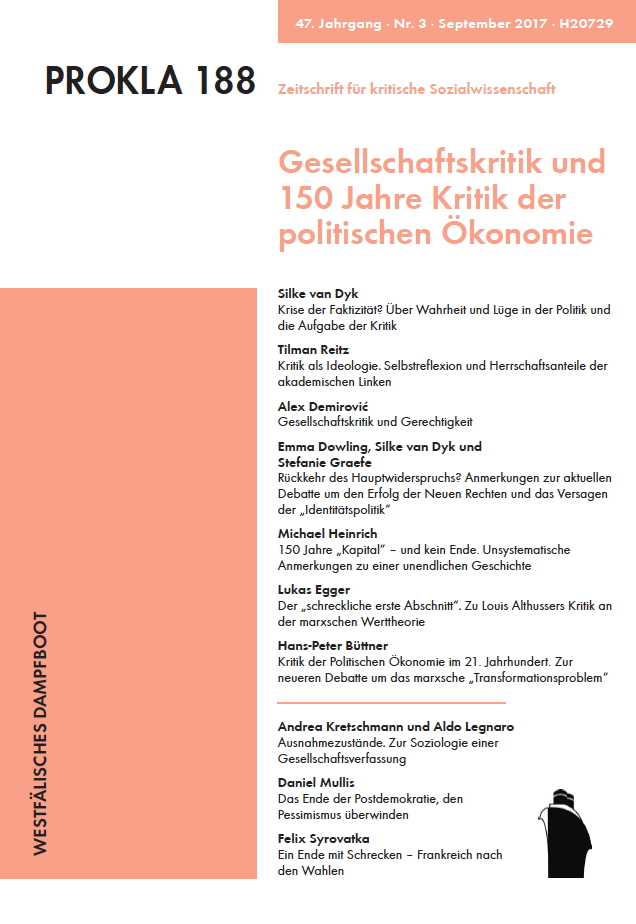The End of Post-democracy, Overcoming Pessimism
DOI:
https://doi.org/10.32387/prokla.v47i188.74Keywords:
Pessimism, Ranciere, Francfourt, protest, DemocracyAbstract
In recent years, political and social conditions have changed dramatically. Many analyses help to capture these dynamics. However, they produce political pessimism: on the one hand there is the image of regression and on the other, a direct link is made between socio-economic decline and the rise of the far-right. To counter these aspects, this article argues that current political events are to be understood less as ‘regression’ but rather as a moment of movement and the return of deep political struggles. Referring to Jacques Ranciere’s political thought, the current conditions can be captured as the ‘end of post-democracy’. This approach changes the perspective on current social dynamics in a productive way. It allows for an emphasis on movement and the recognition of the windows of opportunity for emancipatory struggles.
Downloads
References
Crouch, Colin (2008): Postdemokratie. Frankfurt/M.
Decker, Oliver u.a. (Hg.) (2016): Die enthemmte Mitte. Gießen. https://doi.org/10.30820/9783837972337
della Porta, Donatella (2017): Progressive und regressive Politik im späten Neoliberalismus. In: Die große Regression. Berlin: 57-76.
Eribon, Didier (2009): Rückkehr nach Reims. Berlin 2016 .
Geiselberger, Heinrich (2017): Vorwort. In: Die große Regression. Berlin: 7-15.
Huke, Nikolai (2016): Krisenproteste in Spanien. Zwischen Selbstorganisation und Überfall auf die Institutionen. Münster.
Judt, Tony (2011): Das vergessene 20. Jahrhundert. Frankfurt/M.
Kronauer, Martin (2017): Ausnahmezustand? Weitermachen, wie bisher, geht nicht mehr. In: PROKLA 47(1): 117-122. https://doi.org/10.32387/prokla.v47i186.184
Lefebvre, Henri (1939): Der dialektische Materialismus. Frankfurt/M 1969.
- (1966): Theoretical Problems of Autogestion. In: Brenner, Neil/Elden Stuart (Hg.) (2009): State, Space, World. Minneapolis: 138-152.
- (1968): The Right to the City. In: Kofman, Eleonore/Lebas, Elizabeth (Hg.)(1996): Writings on cities. Cambridge: 63-181.
- (2014): Critique of Everyday Life. Vol. 1-3. New York-London.
Mason, Paul (2017): Keine Angst vor der Freiheit. In: Die große Regression. Berlin: 149-174.
Mullis, Daniel/Schipper, Sebastian (2013): Die postdemokratische und postpolitische Stadt in der Geschichte der kommunalen Selbstverwaltung. In: suburban - Zeitschrift für kritische Stadtforschung 1(2): 79-100.
Mullis, Daniel (2017): Krisenproteste in Athen und Frankfurt. Raumproduktionen der Politik zwischen Hegemonie und Moment. Münster i.E.
Nachtwey, Oliver (2016): Die Abstiegsgesellschaft. Berlin.
Prokla-Redaktion (2016): Der globale Kapitalismus im Ausnahmezustand. In: PROKLA 46(4): 507-542. https://doi.org/10.32387/prokla.v46i185.129
Rancière, Jacques (1997): Demokratie und Postdemokratie. In: Riha, Rado (Hg.): Politik der Wahrheit. Wien: 94-122.
- (1995): Das Unvernehmen. Frankfurt/M 2002.
- (2011): Moments politiques. Zürich.
- (2014): Erfindung des Möglichen. Wien.
Weiß, Volker (2017): Die autoritäre Revolte. Stuttgart.
Žižek, Slavoj (2017): Die populistische Versuchung. In: Die große Regression. Berlin: 293-313.






